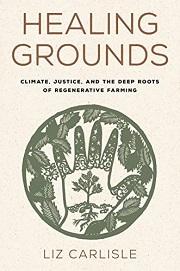Healing Grounds: Climate, Justice, and the Deep Roots of Regenerative Agriculture

Liz Carlisle
Island Press, £22.95 (Hardcover)
There is a lot of culture in agriculture. For most of the ten thousand years, since humans first started to domesticate crops and animals, they have tried to work with the environmental variation in soils and climate to grow food. Only since the industrial and agricultural revolutions have we used inputs of energy, water, fertilizer, herbicides and pesticides to overcome environmental variation. This has had major positive and negative impacts on the food we eat and the environments in which we grow foods. The growth of the human population in the past one hundred years is testament to this.
In this book Carlisle advocates for a return to farming practices that are non-industrial and work with variation, particularly soils. She uses a series of case studies, from immigrants to the USA (forced and voluntary), to demonstrate that rejuvenation of soils through farming practices such as polyculture can lead to greater resilience in the face of, for example, a changing climate. Whilst agriculture is central to the narrative what is fascinating about the book is the social justice vignettes that show how difficult it has been for peoples to maintain their way of raising food in the face of the onslaught from the European input intensive systems.
This book will interest those that wish to better understand the diversity of agricultural practices and their basis within the cultures of the world and how social justice pays out in the way our food is grown.
Iain Gordon FRSE CBiol FRSB


